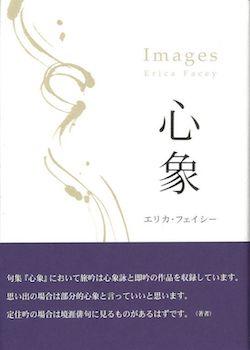Images

By Erica Facey
France-Do (2014)
ISBN-13: 978-4781408149
Review by Chris Beckett
Erica Facey’s delightful bilingual collection, Images, is made up of one-vertical-line haiku in the Japanese, and 3-line haiku in English. The Japanese section starts from the right and meets its English counterpart in the middle coming the other way. There is no mention of a translator, so I assume that Facey is a bilingual poet. That is fascinating in itself and I would love to know which language the poems started in; whether this was different for each poem or the same for all; even if some of the poems drifted between languages like the far travelling daughter in the first poem of the book:
My far travelling daughter
falling cherry blossoms
in Japan
I do not read Japanese, but it seems to me that the poems in Japanese keep to the 5-7-5 haiku model, whereas the English although 3 lines do not. I think that is a good thing as it means Facey can concentrate on rhythm and meaning, on brevity and concentration. And there is never any sense of padding to match the count. So she summons up scenes of e.g. Japan in the West with an evocative and never cloying charm, for example
The young chef
learning ‘whiting’ as the English
name for the fish
So yes, there are cherry blossoms and winter cherries and other seasonal clichés (I mean traditions!) of haiku, but Facey effortlessly shows us how the traditional fits into the everyday; how loved places travel with us in our memories and imaginations, but also in translated words, and of course in common things like tea or clothes, even music, which make their own journeys across the globe and down the centuries:
English summer evening
A woman in Chinese dress
listening to Bach
Facey invites us to meditate on contrasts and similarities, through space and time: how the gathering of poets and plum blossoms which sounds like a scene in Basho’s Japan is actually happening today, at Keat’s House, Hampstead.
Sometimes I yearn for a little more colour or detail, for example that the wind at Matsushima be more fully evoked than simply ‘fragrant’; or that we meet a glass of draft beer perhaps, or a can of green peas, like in a Tawara Machi poem, rather than another cup of tea!
However, there is a natural, unforced quality in Facey’s writing which I really admire. And she is a master of repetition, that all-important poetic technique which is a close sister to rhyme: winter cherries, a daffodil village, the wonderfully moving autumn butterfly, even a summer evening, all grow more lovely and significant every time she evokes them.

